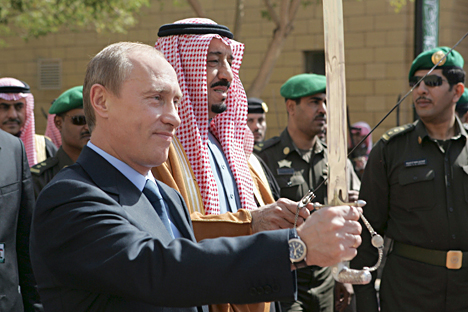Cheap Saudi oil squeezing Russia out of Europe?

Low price of Saudi oil squeezing Russia out of European market. Source: Reuters
Russia’s share in the European oil market is under threat as European refineries boost their purchase of crude from Saudi Arabia, reports Russian online publication Gazeta.ru, citing a source in the petroleum industry.
According to Reuters, several oil majors have stepped up purchases of Saudi crude oil for their refineries in Western Europe and the Mediterranean in recent months, including Exxon, Shell, Total, and Eni.
Igor Sechin, head of the Russian state-controlled oil major Rosneft, said on October 13 that Saudi Arabia had started selling oil in Poland at prices that were below market rates. While this could spell trouble for Moscow’s share of the lucrative European energy market, Russian analysts have been cautious in their assessments of this trend.
“Oil from Saudi Arabia was present on the European market before. In 2010, Europe accounted for some 10 percent of Saudi oil exports, about 30 million tons,” said Alexander Pasechnik, head of research at the National Energy Security Fund.
According to Pasechnik, the issue is the emergence of a new logistics corridor rather than simply a redistribution of market shares.
“The Polish port of Gdansk has started receiving oil consignments from Saudi Arabia. There may be conditions for a rise in cooperation here and, as a consequence, certain risks for Russia,” he said.
Is Saudi oil so dangerous for Russia?
Experts said the expansion to the European market is one of the most logical steps for Saudi Arabia to take since oil-producing OPEC members are not trying to reduce the volume of production.
“In order not to over-saturate the existing market of buyers, it is far easier to expand its boundaries,” said Yury Prokudin, an analyst with foreign exchange resource Fx Bazooka.
Meanwhile, Iran’s imminent arrival on the world oil market adds further urgency to the situation for regional rival Riyadh, which may be attempting to consolidate its grip on markets ahead of Tehran’s entry.
“As soon as sanctions against Tehran are lifted legally, Iranian oil will start to make its way to the European market. It may well be that this is exactly why Saudi Arabia has decided to strengthen its position in Europe now,” said Pasechnik.
Prokudin said while the exact terms of supplies were not yet known, “one can deduce from the current situation on the market that a barrel of Saudi Arabian oil will cost European consumers $48-49, i.e. $4-5 cheaper than a barrel of Urals [crude],” adding that potentially Saudi Arabia could offer an additional discount of $0.5-1.
Russia currently meets around 25 percent of Europe’s oil requirements. This year, supplies have grown by more than 5.5 percent, to 97.6 million tons. However, according to Prokudin’s estimates, Russia may lose up to a third of this in the coming year.
Pasechnik believes that a rise in Saudi oil supplies is more of an alarm bell than a real threat for Russia.
“For European refineries to switch to Saudi oil, investment is needed and a change of the existing logistics chains, which means additional costs. Even the lower price of this oil cannot offset the necessary investment,” Pasechnik said.
What are the possible scenarios for Russia?
If Russia starts to lose its share of the European oil market, the shortfall could theoretically be compensated by supplies to China, since, forecasts indicate that purchases there will rise by 3.2 percent a year.
However, there is a risk that, in the long-term, Russia will face a shortage of investment in the oil sector and a reduction in oil production, which would threaten the guarantee of meeting Asian demand. This is one of the scenarios being considered by the Russian Energy Ministry.
“Furthermore, so far our Asian partners are technically not ready to consume Russian oil in large quantities,” said Pasechnik. “So the European market is still very important for Russia.”
“Furthermore, so far our Asian partners are technically not ready to consume Russian oil in large quantities,” said Pasechnik. “So the European market is still very important for Russia.”
All rights reserved by Rossiyskaya Gazeta.
Subscribe
to our newsletter!
Get the week's best stories straight to your inbox
